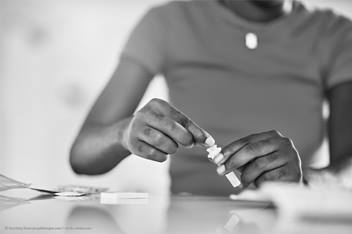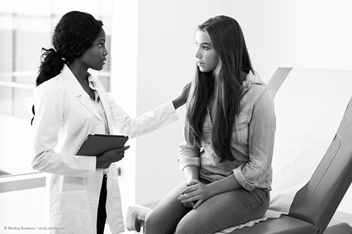HIV Prevention
Human immunodeficiency virus (HIV) can only live inside the body. It attacks the immune system and makes it weak. This makes it harder for your body to fight infections and may cause many health problems if the HIV infection is not treated.
How HIV Spreads
HIV is spread through blood, semen, vaginal fluids, and human milk. It is most commonly spread by:
- Having sex with an infected person.
- Using drugs you inject, including sharing supplies and needles.
Prevention
Not having sex is the best way to avoid HIV and other sexually transmitted infections (STIs). If you do have sex, you can help prevent the spread of HIV by:
- Knowing your partner(s) and their sexual history.
- Using a condom each time you have sex, the whole time you have sex.
- Not sharing needles, syringes, or anything used to prepare drugs you inject.
- Asking your doctor or health care provider about pre-exposure prophylaxis (PrEP). PrEP is a pill you take one time each day to prevent HIV. Your doctor or health care provider can prescribe this medicine to protect you from getting an HIV infection.
- Get tested for HIV if you’re between the ages of 13 and 64 and having sex. You should be tested at least one time for HIV. Your doctor or health care provider may recommend getting tested more often.
- Getting tested and treating any other STIs that you have. Having other STI(s), puts you at a higher risk for getting HIV.
Undetectable = Untrasmittable (U=U)
- If any of your sexual partners have HIV, remind them to take their HIV medicines. When they take their medicines, and the virus is undetectable (low amount of HIV in the blood) they’re not able to pass the virus (untransmittable) on to you through sex.
- If you have been diagnosed with HIV, always take your HIV medicines as prescribed. When the amount of HIV in your body is low enough (undetectable), you’re unable to pass the virus (untransmittable) through sex.
- If you’re pregnant and have HIV, always take your HIV medicine as prescribed and see your doctor or health care provider often. This will protect your baby from getting HIV during pregnancy.
- If you have HIV and need a medical home call the Nationwide Children’s Hospital Family AIDS Clinic and Education Services (FACES) Program at (614) 722-6060.
Talk with your doctor or health care provider about ways to help prevent HIV, including starting PrEP and testing for STIs.
To make an appointment at Nationwide Children’s Primary Care, call (614) 722-6200.
Helping Hands™ Patient Education Materials
Helping Hands™ are easy-to-read guides about different illnesses, therapies, surgeries, and more. They’re created by the Patient Education team at Nationwide Children’s Hospital and are reviewed and approved by clinical staff, like nurses, doctors, pharmacists, and psychologists. Nationwide Children's Hospital is not responsible for misuse of information in patient education materials, including Helping Hands.
HH-I-489 | ©2020, revised 2024, Nationwide Children’s Hospital


